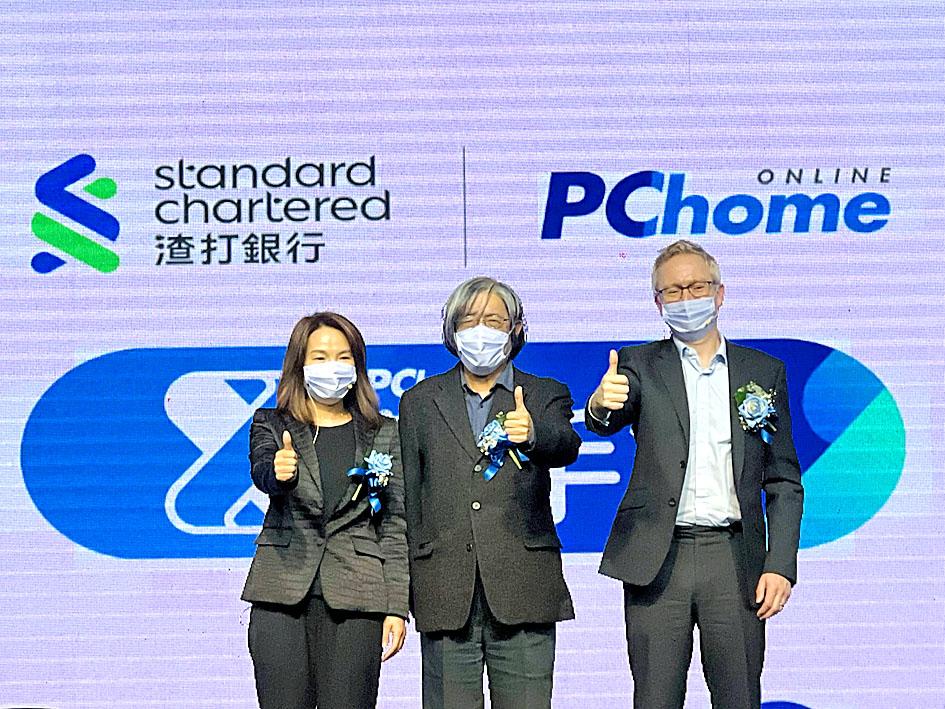Standard Chartered Bank (Taiwan) Ltd (渣打國際商業銀行) yesterday announced that it has partnered with PChome Online Inc (網路家庭) to offer loans to the e-commerce platform’s about 10,000 suppliers to meet their financial needs.
The collaboration came as a surprise in light of PChome’s cooperation with Citibank Taiwan Ltd (花旗台灣) and E.Sun Commercial Bank (玉山銀行) in issuing co-branded credit cards.
Standard Chartered said that it is not planning to launch a credit card with PChome, as the local credit card market is already intensely competitive, but would rather focus on lending to e-commerce retailers.

Photo: CNA
E-commerce retailers are usually overlooked, as banks prefer their brick-and-mortar counterparts, which have tangible assets, Standard Chartered said.
As such, e-commerce retailers’ financial needs are usually not met, it added.
A survey showed that 62 percent of PChome’s suppliers said that they need more working capital as sales have boomed amid the COVID-19 pandemic.
While 69 percent of respondents said they rely on banks for funding, they said the application process is cumbersome, including having to wait at bank offices, the survey showed.
Standard Chartered said that is why its loan program is an online service: Suppliers can file their applications online, but would need to stamp their company seals on paper in line with regulations.
The bank would dispatch a delivery person to pick up the documents, so applicants need not visit its office, it said.
Standard Chartered said it would be able to offer a revolving credit limit that is more accurate than banks’ traditional offerings, as it would be able to access PChome’s database to check the supplier’s operating performance.
The higher a supplier’s sales are, the higher would be its loan quota, it said, adding that the bank would not access clients’ data unless they apply for a loan.
The process utilizes big data analysis, artificial intelligence and application programming interface, as well as data connection among Standard Chartered Bank, PChome and the Joint Credit Information Center (金融聯合徵信中心), it said.
The lending program would be the first in the nation dedicated to e-commerce retailers, it said.
“This service would not only meet the funding demands of small and medium-sized retailers, but it would also help control credit risks. It is essential for us to build a digital financial ecosystem in Taiwan,” Standard Chartered Taiwan CEO Ian Anderson told reporters.
A preliminary evaluation showed that among all of PChome’s suppliers, 10,000 would be eligible to participate in the program, and the bank expects about 20 percent of them to apply for loans by the end of this year.

On Ireland’s blustery western seaboard, researchers are gleefully flying giant kites — not for fun, but in the hope of generating renewable electricity and sparking a “revolution” in wind energy. “We use a kite to capture the wind and a generator at the bottom of it that captures the power,” said Padraic Doherty of Kitepower, the Dutch firm behind the venture. At its test site in operation since September 2023 near the small town of Bangor Erris, the team transports the vast 60-square-meter kite from a hangar across the lunar-like bogland to a generator. The kite is then attached by a

Foxconn Technology Co (鴻準精密), a metal casing supplier owned by Hon Hai Precision Industry Co (鴻海精密), yesterday announced plans to invest US$1 billion in the US over the next decade as part of its business transformation strategy. The Apple Inc supplier said in a statement that its board approved the investment on Thursday, as part of a transformation strategy focused on precision mold development, smart manufacturing, robotics and advanced automation. The strategy would have a strong emphasis on artificial intelligence (AI), the company added. The company said it aims to build a flexible, intelligent production ecosystem to boost competitiveness and sustainability. Foxconn

Leading Taiwanese bicycle brands Giant Manufacturing Co (巨大機械) and Merida Industry Co (美利達工業) on Sunday said that they have adopted measures to mitigate the impact of the tariff policies of US President Donald Trump’s administration. The US announced at the beginning of this month that it would impose a 20 percent tariff on imported goods made in Taiwan, effective on Thursday last week. The tariff would be added to other pre-existing most-favored-nation duties and industry-specific trade remedy levy, which would bring the overall tariff on Taiwan-made bicycles to between 25.5 percent and 31 percent. However, Giant did not seem too perturbed by the

TARIFF CONCERNS: Semiconductor suppliers are tempering expectations for the traditionally strong third quarter, citing US tariff uncertainty and a stronger NT dollar Several Taiwanese semiconductor suppliers are taking a cautious view of the third quarter — typically a peak season for the industry — citing uncertainty over US tariffs and the stronger New Taiwan dollar. Smartphone chip designer MediaTek Inc (聯發科技) said that customers accelerated orders in the first half of the year to avoid potential tariffs threatened by US President Donald Trump’s administration. As a result, it anticipates weaker-than-usual peak-season demand in the third quarter. The US tariff plan, announced on April 2, initially proposed a 32 percent duty on Taiwanese goods. Its implementation was postponed by 90 days to July 9, then